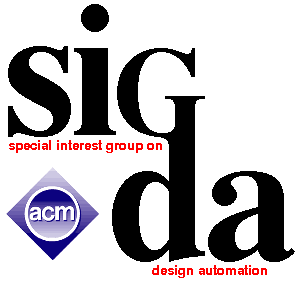
Sponsored by SIGDA
SIGDA Liaison
Prof. Patrick Madden
|
|
Problems and References
To download the tar.gz file for all related papers, click here.
Problem 1: Analysis & Circuit Design
Contributed by: Zhuo Li, IBM Research
Overview:
Latch Hold Time Modeling
Comparative Analysis of Master-Slave Latches and Flip-Flops for
High-Performance and Low-Power Systems,
Vladimir Stojanovic and Vojin G. Oklobdzija. IEEE Journal of Solid-State
Circuits, Vol. 34, No. 4, April 1999, pp. 536-548.
Problem 2: Physical Design
Contributed by: Mehmet Yildiz, IBM EDA
Overview:
Placement legalization
On Legalization of Row-Based Placements,
A.B. Kahng, I.L. Markov, and S. Reda. Great Lakes Symposium on VLSI, pp.
214-219, 2004.
Problem 3: Logic & High-Level Synthesis
Contributed by: Marc Riedel, University of Minnesota
Overview:
Input-Dependent Analysis of the Probability of Failure of Logic
Evaluating Circuit Reliability Under Probabilistic Gate-Level Fault
Models,
Ketan N. Patel, Igor L. Markov and John P. Hayes. IWLS 2003.
Problem 4: System Design and Analysis
Contributed by: Marc Riedel, University of Minnesota
Overview:
Generalized Switch-Level Circuits
A Symbolic Analysis of Relay and Switching Circuits,
C. E. Shannon. Master's Thesis, MIT, 1938. See Section III,
``Multi-Terminal and Non-Series-Parallel Circuits,'' p. 477.
Problem 5: Functional Verification
Contributed by: Geert Janssen, IBM Research
Overview:
On-the-fly optimization of AIGs
Local Two-Level And-Inverter Graph Minimization without Blowup,
Robert Brummayer, Armin Biere. In Proc. 2nd Doctoral Workshop on
Mathematical and Engineering Methods in Computer Science (MEMICS'06),
Mikulov, Czechia, October 2006.
Problem 6: Timing, Test, and Manufacturing
Contributed by: Puneet Gupta, UCLA
Overview:
IDDQ Testing and Modeling
General reading on IDDQ testing, Monte-Carlo techniques and usage of
OpenAccess
2.2.4.
Computer Platform
During the contest one desktop computer will be available per team.
This will be a Pentium 4 running a standard installation of SuSE
Linux 10.2. All necessary software and the problem statements will be
pre-installed. Also, in your home directory you will find a
recommended directory structure to organize your work. You are
allowed to bring reference materials, but you cannot use laptops, the
internet, or printed materials. If you have a question about what is
allowed, please contact the CADathlon organizing committee.
|


